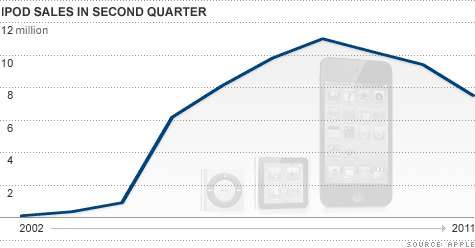
NEW YORK (CNNMoney) -- While Apple is setting records with its iPad and iPhone, the iPod is sinking fast.
Apple (AAPL, Fortune 500) sold just 7.5 million iPods in its most recent quarter. It was the lowest since the fall of 2005, when the iPod was just 4 years old.
Unit sales fell 20% from a year ago and revenue from those sales dropped 15%.
It's still a lucrative business for Steve Jobs & Co., bringing in $1.3 billion in sales over the past three months. But sales have been in a free-fall for the past three years. For a product line that once delivered more revenue than the Mac line (in 2006) and reached more than $9 billion in sales (in 2008), the iPod's glory days have passed Apple by.
There are several reasons for the iPod's decline. The transition away from traditional hard drives to solid-state memory means the devices have no moving parts and break far less frequently. And the iPhone has cannibalized sales of the iPod. Other smartphones -- like Google's (GOOG, Fortune 500) Android devices -- may also be stealing sales from the iPod..
That iPhone cannibalization could be exacerbated this fall once Apple unveils its iCloud, which enables users to wirelessly push songs to all of their connected devices. The iPod shuffle, nano and classic, which collectively represent half of all iPod sales, have no wireless connectivity.
Yet experts say Apple can't simply cut off the iPod like it's dead weight. It still maintains a 70% share of the MP3 player market, and it has broad appeal in developing nations in Latin America, the Middle East and East Asia.
And at prices that range from $49 to $399, the iPod represents the lowest-priced entry point to the Apple product lineup. Apple has said repeatedly that it believes strongly in the halo effect, in which satisfied customers of lower-priced products come back to buy higher priced Apple products down the road.
So what's Apple to do?
One possibility is to add wireless connectivity to the iPod classic and nano. While that wouldn't be too difficult to install in the classic, it could pose problems for the nano -- a device that isn't much bigger than your thumbnail.
"To get a Wi-Fi chipset into a nano form factor, there would be power and battery issues," said Mike McGuire, analyst with Gartner. "If anyone could do it, I suppose it would be Apple."
Another idea is to increase the memory or lower the price of the iPod touch and start to phase out the lower-end models by discontinuing the iPod classic.
A relevant parallel example could be found in the $999 white MacBook, a product that Apple kept around until there was an alternative at the same price point. The company finally discontinued the white MacBook last week when it refreshed the MacBook Air line and gave the $999 Air a competitive processor.
"Apple's sweet spot on the iPod product line is traditionally around $150," said Ross Rubin, analyst at NPD. "Could they reach that point on the iPod Touch? Perhaps. But if they can get the flash memory to double, that will represent the swan song for the classic."
Apple traditionally refreshes its iPod lineup in the fall, right before the holiday shopping season begins.
Apple declined to comment for this article other than to reiterate what Apple executives said on their most recent earnings conference call: iPods outsold internal expectations during the past quarter. But experts agree that the iPod lineup has one more update in it. After that, it's up in the air.
"Apple is gauging the market demand quite well for the iPod as well as their expectations with suppliers," said Ben Bejarin, director of Creative Strategies. "So until they really start losing money, I think they will continue to support the iPod business to some degree."
Others think the non-iPod touch phase-out could happen sooner.
"I would expect Apple to begin to de-emphasize the unconnected iTunes devices within the next 12 to 15 months," said Laura DiDio, principal of ITIC. ![]()